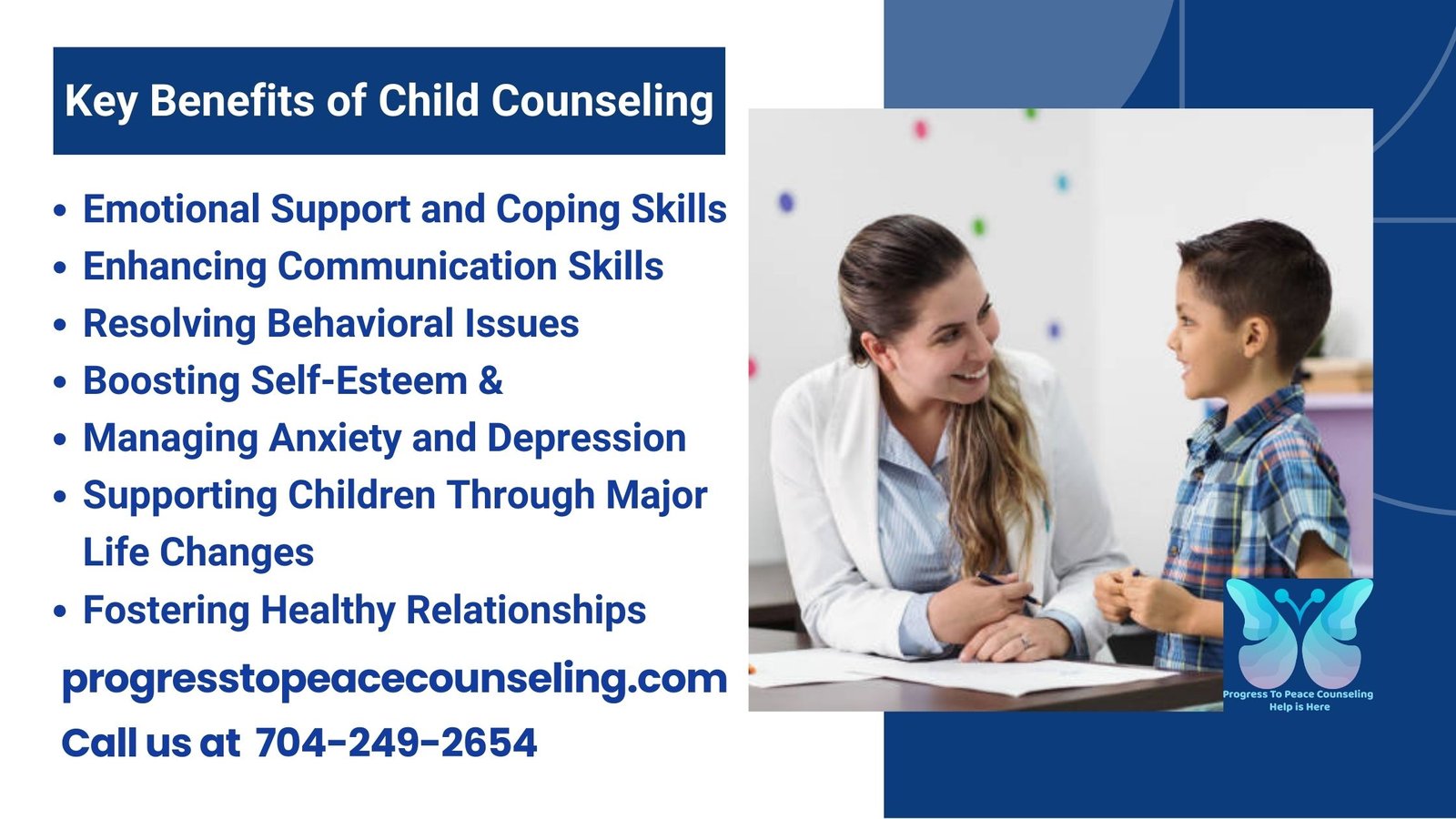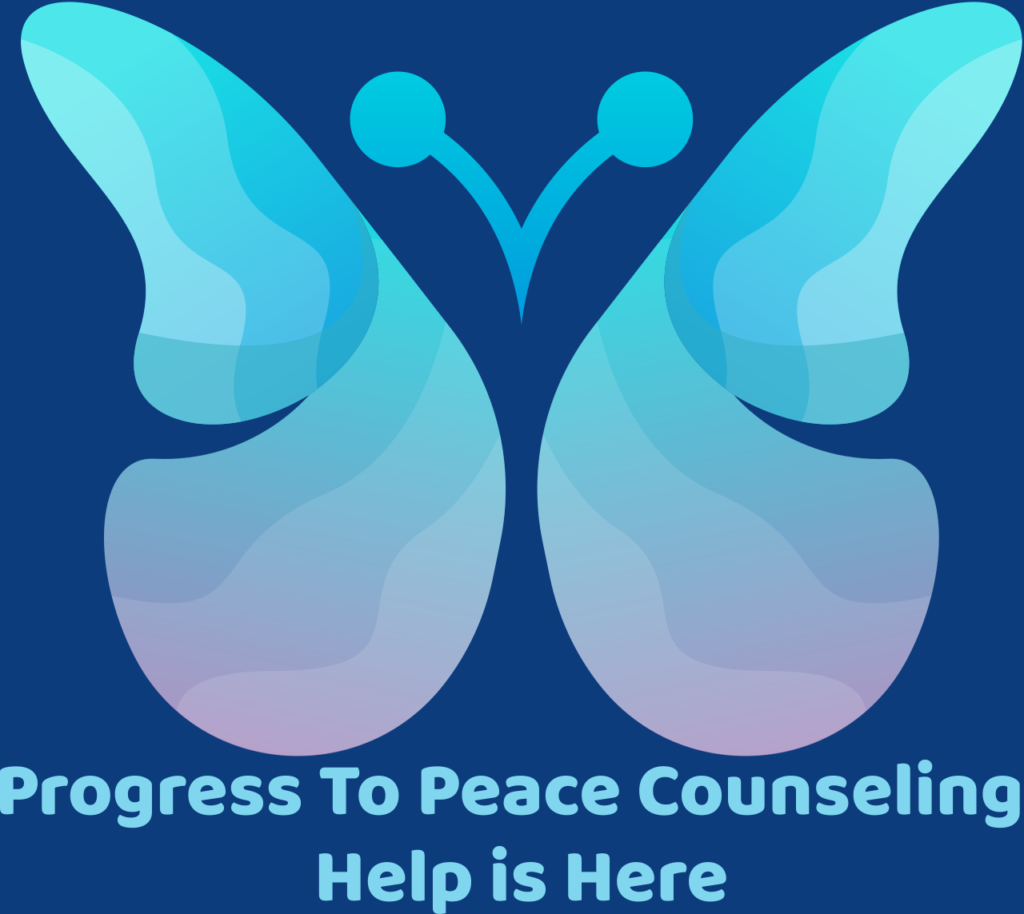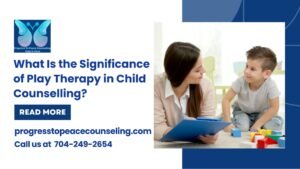Being a parent is a wonderful adventure that is full of love, difficulties, and the desire to raise a child that is content and healthy. But just like adults, children go through a variety of emotions, difficulties, and developmental stages that can occasionally be challenging to overcome. Child counseling in Charlotte NC provides expert advice and answers to a range of emotional, social, and psychological problems, becomes an essential tool to support kids and their families throughout these times.
The advantages of child therapy will be discussed here, with an emphasis on how it can support children’s resilience, healthy development, and coping with difficulties.
9 Key Benefits of Child Counseling
1. Emotional Support and Coping Skills
Children often find it challenging to articulate their feelings, especially when they face situations like family conflict, bullying, or the loss of a loved one. Child counseling provides them with the emotional support they need to navigate these complexities.
Benefits:
- Building Emotional Awareness: Counselors help children identify and name their emotions, making it easier for them to understand what they’re feeling and why.
- Teaching Coping Mechanisms: Techniques like deep breathing, mindfulness, and journaling are often introduced, equipping children to manage stress and anxiety effectively.
- Normalizing Feelings: Therapy reassures children that it’s okay to feel sad, angry, or scared, fostering emotional acceptance.
2. Enhancing Communication Skills
Many children struggle to express their thoughts or feelings clearly, leading to frustration or withdrawal. Counseling addresses these barriers by teaching children how to communicate effectively.
Benefits:
- Articulating Needs: Therapists encourage children to verbalize their needs, whether it’s asking for help or setting boundaries with peers.
- Improving Listening Skills: Active listening is often a focus, helping children understand the importance of two-way communication.
- Strengthening Family Bonds: Counseling often involves family sessions, allowing parents and children to engage in meaningful dialogue.
3. Resolving Behavioral Issues
Some children exhibit challenging behaviors such as defiance, aggression, or hyperactivity, often stemming from unresolved emotional issues. Child counseling can identify the root causes and provide strategies to address them.
Benefits:
- Behavior Management Plans: Therapists work with children and parents to create actionable plans that encourage positive behaviors and reduce negative ones.
- Improved Social Interactions: Therapy teaches children empathy and conflict resolution skills, enhancing their relationships with peers and adults.
- Reducing Impulsivity: Cognitive-behavioral techniques can help children think before acting, particularly in cases of ADHD or similar disorders.
4. Boosting Self-Esteem and Confidence
Low self-esteem can impact a child’s academic performance, social interactions, and overall happiness. Counseling can be instrumental in building a child’s self-worth.
Benefits:
- Celebrating Strengths: Counselors help children recognize their unique talents and abilities, shifting their focus from weaknesses to strengths.
- Setting Achievable Goals: Small, attainable goals are introduced to help children experience success and build confidence.
- Addressing Negative Self-Talk: Therapy teaches children to replace self-criticism with positive affirmations, fostering a healthier self-image.
5. Managing Anxiety and Depression
Mental health issues like anxiety and depression are increasingly prevalent among children due to academic pressure, social media influence, and other stressors. Early intervention through counseling can be life-changing.
Benefits:
- Reducing Symptoms: Therapy provides tools to manage symptoms such as restlessness, fear, or sadness.
- Preventing Escalation: Addressing mental health concerns early prevents them from developing into chronic conditions in adulthood.
- Encouraging Healthy Habits: Counselors often guide children toward better sleep patterns, physical activity, and nutrition to improve overall well-being.

6. Supporting Children Through Major Life Changes
Life changes like moving to a new city, parental divorce, or welcoming a new sibling can be overwhelming for children. Child Counseling offers them a safe space to process these transitions.
Benefits:
- Understanding Change: Therapists explain changes in an age-appropriate manner, helping children feel less confused or frightened.
- Providing Stability: Regular counseling sessions offer a consistent environment where children can express their concerns.
- Rebuilding Trust: For children affected by events like divorce, therapy can help restore trust in relationships.
7. Fostering Healthy Relationships
Children often encounter social challenges, including making friends, dealing with peer pressure, or navigating conflicts. Counseling equips them with the skills needed to build and maintain healthy relationships.
Benefits:
- Teaching Empathy: Counselors help children understand other people’s perspectives, enhancing their ability to connect with others.
- Encouraging Teamwork: Group therapy or role-playing activities promote teamwork and collaborative problem-solving.
- Handling Peer Pressure: Therapy prepares children to make independent choices and resist negative influences.
8. Empowering Parents
One of the often-overlooked benefits of child counseling is the guidance it provides to parents. Counselors work closely with families, offering insights and strategies to better support their child’s development.
Benefits:
- Understanding Behavior: Parents gain a deeper understanding of their child’s actions and the reasons behind them.
- Learning Effective Techniques: From positive reinforcement to active listening, parents are equipped with tools to foster a nurturing home environment.
- Building a Support System: Family counseling sessions often strengthen familial bonds, ensuring that children feel loved and supported.
9. Preparing for Future Challenges
Childhood is a foundational period where lifelong habits, coping mechanisms, and worldviews are formed. Counseling prepares children to face future challenges with resilience and adaptability.
Benefits:
- Cultivating Problem-Solving Skills: Therapy encourages critical thinking and decision-making, skills essential for adulthood.
- Promoting Independence: By teaching children how to manage their emotions and make informed choices, counseling fosters independence.
- Encouraging a Growth Mindset: Children learn to view setbacks as opportunities for growth, a perspective that benefits them throughout life.
When Should You Consider Child Counseling?
It’s important to recognize when your child might need professional support. Some signs include:
- Persistent sadness or anxiety.
- Behavioral changes like aggression or withdrawal.
- Difficulty concentrating or a sudden drop in academic performance.
- Trouble sleeping or eating.
- Expressing thoughts of self-harm or hopelessness.
Seeking counseling at the right time can prevent these issues from escalating and ensure your child receives the support they need.
Conclusion
Child counseling with Progress to Peace Counseling is not just a remedy for existing issues but a proactive step toward fostering emotional health, resilience, and happiness in children. Whether your child is facing a specific challenge or could benefit from improved communication and coping skills, counseling offers a wealth of tools to support their growth.
Investing in your child’s mental health today lays the foundation for a brighter, healthier future. If you notice signs of struggle or simply want to enhance your child’s emotional well-being, consider seeking the help of a professional child counselor. After all, every child deserves the chance to thrive.














